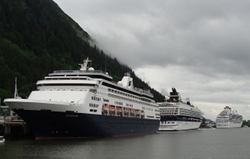
The Juneau Assembly is set to move forward with “housekeeping” changes to the city’s Marine Passenger Fee code.
The five-dollar per head fee for cruise ship travelers was enacted by Juneau voters in 1999, before Congress passed the most recent federal law governing how such money can be spent — the Maritime Security Act of 2002.
City Attorney John Hartle last night (Monday) told the Assembly Committee of the Whole that the city has always been careful to comply with the law, but it doesn’t hurt to tweak the code to make sure there’s no doubt.
“It’s hard for me to say what the risk of litigation is,” Hartle said. “I hear rumblings every year about the cruise industry is ready to litigate over our expenditures of these fees. But my view is, based on the latest case law, we strictly follow the law.”
That means spending the fee revenue on services and infrastructure used by the cruise industry and its passengers. The current code specifically identifies “emergency services, transportation impacts and recreation infrastructure.” It also says the fee is to be used to “mitigate” impacts by cruise ship passengers.
Since none of that language is in the Maritime Security Act, Hartle recommends that it be removed and replaced with the more general statement that the fee is to be used “for services and infrastructure rendered to cruise ships and cruise ship passengers.” He says the city would still be able to argue that the fee can be used to mitigate impacts if the industry ever decided to sue.
“We will say to the court, ‘When you bring a million passengers and I don’t know how many crew to a town of 30,000 in a three-month period, you’re going to have impacts and they’re going to need to be mitigated and they’re going to be expensive,'” Hartle said.
Assemblyman Randy Wanamaker questioned Hartle about the most substantive proposed change. Currently, boats with accommodations for 40 or fewer passengers are exempt from the fee. Hartle recommends making it 20 or fewer passengers to provide more protection from lawsuits charging that the city is singling out large operators. Wanamaker said he’d need more information to support such a change.
“I wonder about the cost of us collecting the extra funds from vessels down to twenty, whether it’s more of an administrative burden than it’s worth,” said Wanamaker. “And a disincentive for smaller vessels to come to the community.”
Hartle called on Port Director Carl Uchytil, who said only a handful of vessels would be affected and the administrative costs would not increase.
“Because they [the smaller vessels] come only every other week. It’s not a great deal of money, but I hear what the city attorney is trying to do to be consistent throughout the cruise industry and the reason to make these changes,” Uchytil said.
The committee voted unanimously to forward the proposed changes to the full assembly.
After the meeting Princess Cruises Director of Shore Operations Kirby Day said the measure passes muster with the industry.
“They’ll probably hear from some of the smaller cruise lines, just because nobody likes to see their costs go up regardless of what you’re spending,” Day said. “But my view is that it’s probably a minimal issue and most of this was just to dot the I’s and cross the T’s.”
The ordinance will be scheduled for a public hearing at the Assembly’s August 13th regular meeting.
